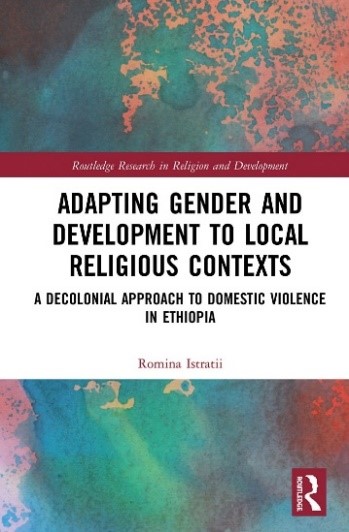BOOK LAUNCH Oct 28th: Adapting Gender and Development to Local Religious Contexts
Please join us to celebrate and discuss this exciting new book!
BOOK LAUNCH: Adapting Gender and Development to Local Religious Contexts by Romina Istratii
Wed, 28 October 2020
12:00 – 13:00 GMT
Register here for the free event.
I’m delighted to announce the launch of Romina Istratii’s new book Adapting Gender and Development to Local Religious Contexts: A Decolonial Approach to Domestic Violence in Ethiopia. Romina will be joined in discussion by Emma Tomalin, Professor at the University of Leeds, convenor of the DSA Religions and development study group, and series editor for Routledge Research in Religion and Development.
This book provides a critical and decolonial analysis of gender and development theory and practice in religious societies through the presentation of a detailed ethnographic study of conjugal violence in Ethiopia. Responding to recent consensus that gender mainstreaming approaches have failed to produce their intended structural changes, Romina Istratii explains that gender and development analytical and theoretical frameworks are often constructed through western Euro-centric lenses ill-equipped to understand gender-related realities and human behaviour in non-western religious contexts and knowledge systems. Instead, Istratii argues for an approach to gender-sensitive research and practice which is embedded in insiders’ conceptual understandings as a basis to theorise about gender, assess the possible gendered underpinnings of local issues and design appropriate alleviation strategies. Drawing on a detailed study of conjugal abuse realities and attitudes in two villages and the city of Aksum in Northern Ethiopia, she demonstrates how religious knowledge can be engaged in the design and implementation of remedial interventions. This book carefully evidences the importance of integrating religious traditions and spirituality in current discussions of sustainable development in Africa, and speaks to researchers and practitioners of gender, religion, and development in Africa, scholars of non-western Christianities and Ethiopian studies, and domestic violence researchers and practitioners.
Read a preview and the chapter abstracts on the publisher’s page: https://www.taylorfrancis.com/books/9781003006992
Reviews
“Romina Istratii’s book is a refreshingly comprehensive exploration of the link between religious beliefs and practices and intimate partner violence. Her work is ambitious in scope, impressive in its breadth and depth, and an important contribution to any nuanced understanding of the impact of religion or abusive relationships in a local context. The myriad challenges she experiences in the execution of the research are thoughtfully discussed and her engagement with the relevant academic literature is noteworthy. As a result, her research will be useful to scholars in many fields.” — Nancy Nason-Clark, Professor Emerita, Department of Sociology, University of New Brunswick, Canada
“In this theoretically sophisticated and ethnographically grounded monograph – that focuses on Ethiopia – Romina Istratii questions ‘the idea of treating popular gender theories as globally relevant’ because they fail to view gender realities as ‘nuanced, complex and non-uniform’, as well as to consider how the ‘non-secular’ plays a role in shaping gender subjectivities and relations. This book is an important contribution to a growing field of studies that seeks to problematise the dominant secular Gender and Development paradigm, where it seeks to understand and transform gender relations, to eradicate social ills such as domestic violence, yet is underpinned by Euro-centric assumptions that are rarely addressed.” — Emma Tomalin, Professor in the School of Philosophy, Religion and History of Science, Leeds University, UK
About the author
Dr Romina Istratii is Research Associate to the Department of Development Studies and the Centre of World Christianity, SOAS University of London, UK. She previously served as Senior Teaching Fellow in the School of History, Religions and Philosophies, teaching on Religions and Development. Her research lies at the intersection of gender, religious studies and development and applies a decolonial perspective to gender and development practice informed by a decade’s experience in community-based research in sub-Saharan Africa. She has previously written on the ethics of international development, western gender metaphysics and religious knowledge systems, and the discourse of fundamentalism in gender studies. Since 2016, Dr Istratii has been an active member of the Decolonising SOAS Working Group, initiating in 2019 the Decolonising Research Initiative on behalf of the SOAS Research Directorate. She is co-founder of Decolonial Subversions.
Contact: If you have any questions about the event or the Centre of World Christianity and its seminar series, please contact Dr Lars Peter Laamann at [email protected].
